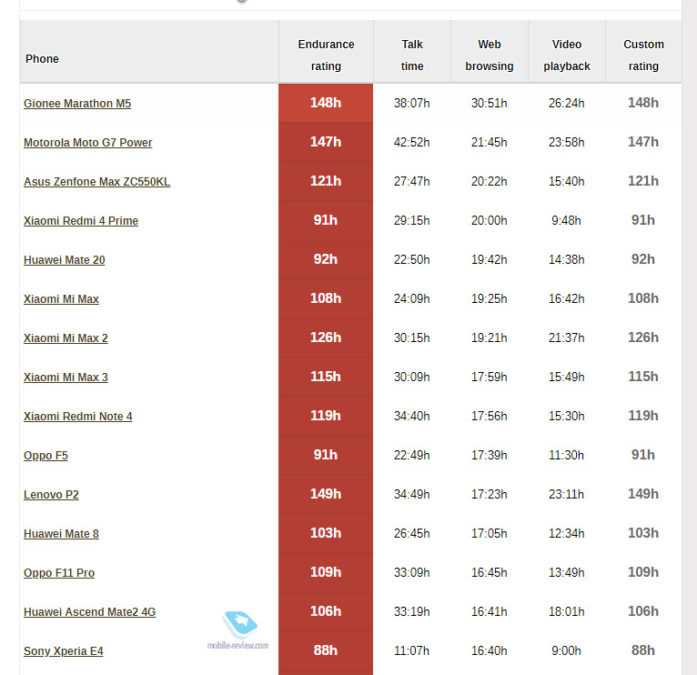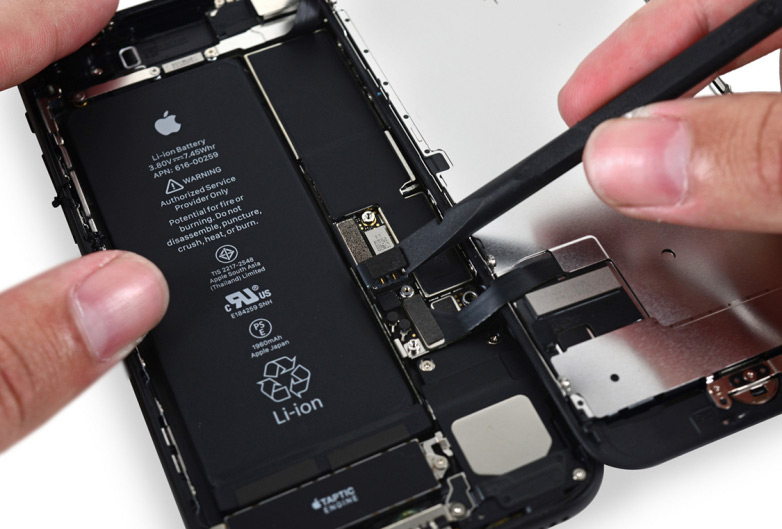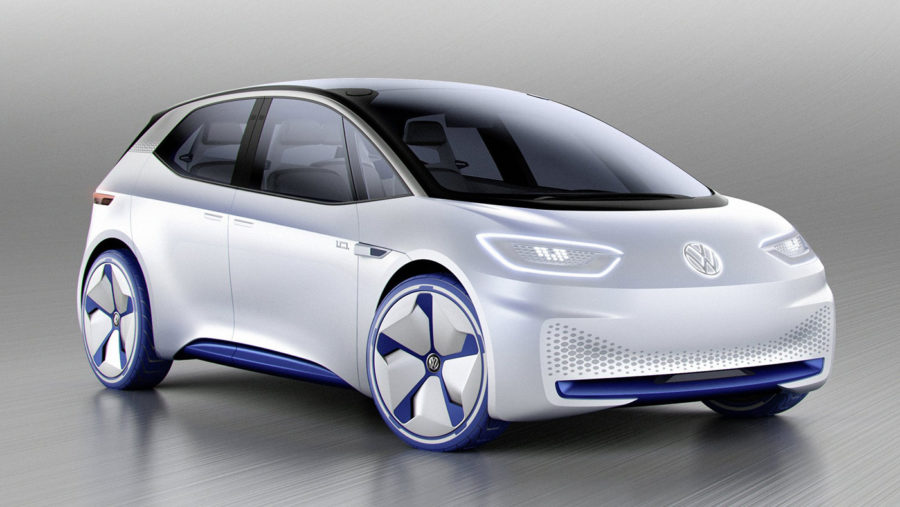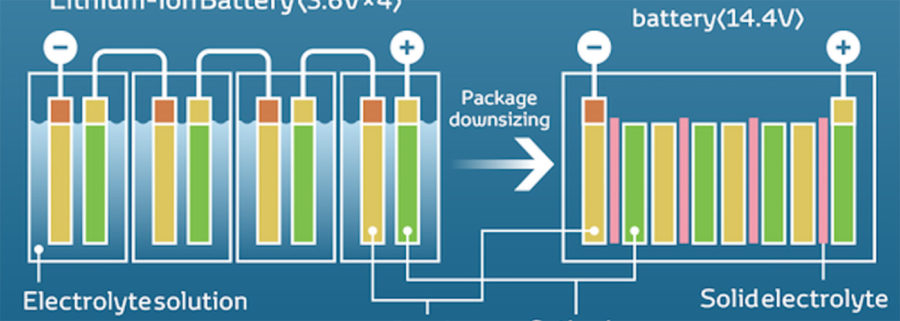Why are there still no normal batteries? This question has puzzled me for a long time. Every year you hear the same thing from tech manufacturers: 'Our new smartphones / laptops last much longer than before. We have optimized the software, we have new chipsets, energy efficient cores, and so on. '
But in fact, there are almost no changes. Remember, there was once a TV show where the participants said: 'I'll guess this melody with 5 notes'. So, let's play too. My move is 'I'll drain my Galaxy Note 9 battery by 2pm' (assuming my day starts at 8am). Write your answers in the comments.

Leaders in battery life with gsmarena.com
By the way, my second device is BlackBerry Key2, and in terms of battery life it is heavenly bliss (I almost feel the taste of 'Bounty' when I reply to mail from it). It is enough for a full day of hard work. But this is rather an exception, only confirming my case. For many years there has been no qualitative breakthrough in the battery life of mobile gadgets. The same Blackberry Key2 lives well thanks to the small screen and the energy efficient 660 Snapdragon. And I want a similar autonomy for the Note 9, and preferably in games mode.

Considering that battery life is a sore spot for almost all gadgets, the attempts of some manufacturers to make money on this cause my sincere anger. And here, of course, I'm talking about Apple, which, under the guise of caring for its users, purposefully turned iPhone into a lagging brick, urging to buy a new phone as soon as possible. By the way, do you remember at the dawn of the iPhone building there was a myth that with each new firmware iPhone it becomes slower? And many were even afraid to update, and Apple still pushed for an update, which is why devices with 16 or 32 GB of memory had problems with free space. There is a suspicion that that myth was not a myth either, they just did not have time to figure out the company.

I don't like the current concept that manufacturers have with regard to batteries. In particular, companies say that a battery is a consumable, so here's a quick charge that leads to overheating and degradation of batteries, then after a year or even earlier you will come to a service center, pay a few thousand, and everything will be fine with you. Perhaps the idea that the battery is a 'consumable' suits those who change machines every year. But such a minority.
In my opinion, manufacturers are obliged to make sure that the battery lasts for at least two years without losing capacity, and then I'll just put up with fast charging. And you don't need to tell me about the lack of technology, physics, capacities and other difficulties. When I came to buy my smartphone, I didn’t tell how hard it was to get the money, I didn’t cry and didn’t ask for a discount. But in theory he could! As a journalist, I have contacts, agencies, press services, and all kinds of business cards. But no, I honestly fulfilled my part of the deal – I went to the store, paid the money. The manufacturer promised me, I quote the site: 'We present a powerful battery that can work all day without recharging. What you need for your pace of life. one'. And at the end, '1' is a footnote. I thought that now they will explain to me exactly what my rhythm of life should be. But it turned out to be even cooler: 'Based on the results of the study. Research conducted by Strategic Intelligence Department with preliminary release. Battery life will vary depending on the network environment, the applications you use, the frequency of calls and messages you send, the number of charges and other factors. ' What does this even mean? Took a pre-production sample and concluded that the environment was stronger than their technology? Well, write as it is.
Just think about this fact. Current lithium-ion battery technology on the market since 1991. And the stories about how the battery autonomy will grow, I personally remember from the second half of the 90s. Relatively speaking, for a quarter of a century, manufacturers around the world have been promising a breakthrough that will lead us to a bright autonomous future. And nothing has changed.
By the way, about the cart. Electric cars are already driving through the streets, and under the hood they still have the same lithium-ion. And it seems to me that this is some kind of world conspiracy. Well, it doesn't happen that the 5 nm technology has already been mastered in chipsets, but no one can do anything with batteries. You, too, pay attention to articles with loud headlines about daring startups that promise breakthroughs. Where are they? I googled. They are either bought by large corporations, or they disappear without a trace. I think it's a game of good and bad cops. People in expensive suits come to a promising startup and offer to agree on a good or bad basis. They buy the willing, the rest disappear. I would not be surprised if it turns out that it is at the bottom of the sea. The idea is probably that if the batteries last for a long time, people will even more so stop updating the technology.

I hope that the situation will change in the near future. And the electric car industry will become the locomotive. Manufacturers will compete over whose car can go further, and this will lead to the development of the industry. Because otherwise you will have to load the car with a lot of batteries that weigh hoo!
Also, keep in mind that current lithium-ion batteries are dangerous. Each of them contains an electrolyte, which is highly flammable if the integrity of the battery shell is broken.
Perhaps another impetus will be the fact that usually the warranty service for a new car is 3-5 years. Of course, the manufacturer can declare that the battery is a consumable, but then who will buy such a car? It is easier to make the battery last for the warranty period.
According to the articles, Volkswagen and various startups in California are developing the topic of solid-state batteries, that is, no more flammable electrolytes, just ceramics and polymers. VW has invested $ 100 million over the past year to develop this technology. I think there must be some result. This is, after all, not Russia, so that $ 100 million would disappear irrevocably.
The money was invested in QuantumScape, which promised that the new VW will travel 745 kilometers on a single charge on their battery (it would be funny if he connected such a battery to a smartphone, and he dropped it as if nothing had happened in half a day and then it was to blame: ' That's Yandex.Music! '). In theory, QuantumScape batteries should charge faster and be lighter than lithium-ion batteries. However, in general, it's too early to rejoice, since even in the published press release, 2025 is indicated as the release date. Anyway, I doubt these guys. A press release with a picture was released trying to explain what they came up with. So they didn't even fit the whole picture. The stump was given.

But still, why does it take so long to develop? And here the answer is obvious and without any conspiracy theories. All current factories are built to work with lithium-ion batteries. And solid-state batteries are a completely different technology, that is, in other words, you need to take out all the current equipment and install new ones. It is logical that no one wants to do this unless absolutely necessary, so all hope is for decisive pioneers like Elon Musk, who will build a powerful plant from scratch. This plant will start making batteries of a new generation, and then everyone will rush to catch up and rebuild their production facilities.
Write in the comments your indignation about the batteries. You can compliment phones and laptops for which you are satisfied with the battery life. Tell us what other aspects of technology upset and displease you. Do you need a separate boiler for those who put in smartphones MediaTek?
